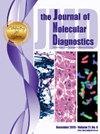Clinical Bioinformatician Body of Knowledge—Bioinformatics and Software Core
IF 3.4
3区 医学
Q1 PATHOLOGY
引用次数: 0
Abstract
With the evolution of next-generation sequencing–based testing in molecular diagnostics laboratories, the clinical role of bioinformaticians has also evolved. The Association for Molecular Pathology's Clinical Bioinformatician Body of Knowledge aims to define the various roles the clinical bioinformatician operates individually or within a clinical bioinformatics team, along with proficiencies and skill sets that may be required or desirable across these roles. One of the most common professional responsibilities of a clinical bioinformatician is to implement bioinformatics pipelines, either vendor supplied or custom built for the assays in the molecular diagnostics laboratory, along with analysis and quality control of clinical genomics data. This second article in the series describes the various stages in the life cycle of a clinical bioinformatics pipeline and the considerations, areas of expertise, and skill sets required in each stage. This information may help laboratory professionals to better work with clinical bioinformaticians and laboratory directors to hire the appropriate expertise based on the specific needs of the laboratory.
临床生物信息学知识体系-生物信息学和软件核心:分子病理学协会的报告。
随着分子诊断实验室中基于测序的新一代检测技术的发展,生物信息学家的临床角色也在不断发展。分子病理学协会的临床生物信息学家知识体系旨在定义临床生物信息学家单独或在临床生物信息学团队中操作的各种角色,以及这些角色可能需要或期望的熟练程度和技能集。临床生物信息学家最常见的专业职责之一是实施生物信息学管道,无论是供应商提供的还是定制的,用于分子诊断实验室的分析,以及临床基因组学数据的分析和质量控制。该系列的第二份手稿描述了临床生物信息学管道生命周期的各个阶段,以及每个阶段所需的考虑因素、专业领域和技能集。这些信息可以帮助实验室专业人员更好地与临床生物信息学家和实验室主任合作,根据实验室的具体需求雇用适当的专业人员。
本文章由计算机程序翻译,如有差异,请以英文原文为准。
求助全文
约1分钟内获得全文
求助全文
来源期刊
CiteScore
8.10
自引率
2.40%
发文量
143
审稿时长
43 days
期刊介绍:
The Journal of Molecular Diagnostics, the official publication of the Association for Molecular Pathology (AMP), co-owned by the American Society for Investigative Pathology (ASIP), seeks to publish high quality original papers on scientific advances in the translation and validation of molecular discoveries in medicine into the clinical diagnostic setting, and the description and application of technological advances in the field of molecular diagnostic medicine. The editors welcome for review articles that contain: novel discoveries or clinicopathologic correlations including studies in oncology, infectious diseases, inherited diseases, predisposition to disease, clinical informatics, or the description of polymorphisms linked to disease states or normal variations; the application of diagnostic methodologies in clinical trials; or the development of new or improved molecular methods which may be applied to diagnosis or monitoring of disease or disease predisposition.

 求助内容:
求助内容: 应助结果提醒方式:
应助结果提醒方式:


